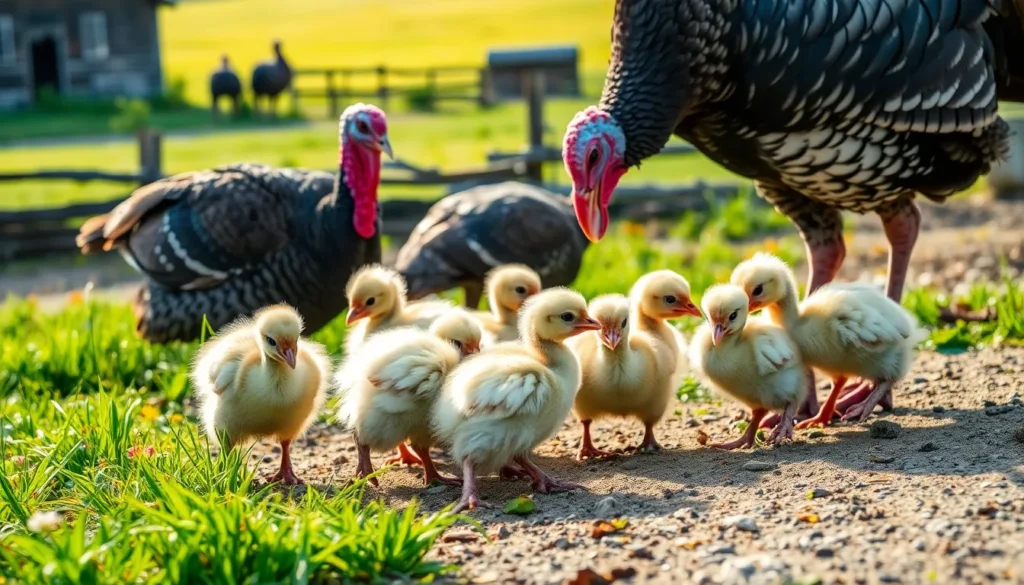When it comes to life on the farm, there’s nothing quite as adorable as turkey babies. Yes, turkey chicks, affectionately called poults, are not only cute but also full of surprises you might not expect. They waddle around with all the grace of a toddler learning to walk and chirp like there’s no tomorrow. Raising these feathery friends can be a rewarding try, filled with laughter and a fair share of lessons. In this comprehensive guide, we’ll explore everything you need to know about turkey babies, from their natural behavior to their dietary needs. Prepare for some clucking good insights.
Table of Contents
ToggleUnderstanding Turkey Biology and Behavior

Turkeys are fascinating creatures, renowned for their unique biology and quirky behaviors. They belong to the family Phasianidae and exhibit sexual dimorphism: male turkeys, known as toms, are larger and far more flamboyant than their female counterparts, the hens. Adult turkeys can weigh anywhere from 15 to 30 pounds, and their striking feathers are often iridescent, which makes them exceptionally beautiful.
When it comes to turkey babies, they inherit some cool traits from their parents. For instance, poults are precocial, which means they are relatively mature and mobile from the moment they hatch. Almost immediately, they start exploring their surroundings, instilling a sense of wonder in anyone who watches. Social creatures by nature, they thrive in flocks, often forming close bonds with their siblings.
Also, poults communicate through various vocalizations. Chirps, peeps, and even growls, these little sounds help them establish social hierarchies and signal their needs. Understanding these behaviors helps caretakers provide a nurturing environment.
Nesting and Incubation
Successful nesting and incubation are crucial steps in ensuring healthy turkey babies. Wild turkeys typically nest on the ground in tall grasses or underbrush, creating a cozy spot where they can lay their eggs. A hen usually lays about 10 to 12 eggs, and once her clutch is complete, she’ll spend about 28 days incubating them.
Incubation is a big deal. During this time, it’s essential for the hen to maintain a proper temperature and humidity level. If she’s disrupted or distracted, it could hinder the hatching process. In domestic farming, many opt for incubators to mimic these conditions. Setting the temperature between 99°F and 102°F is critical, along with maintaining proper humidity levels. If conditions are just right, those adorable little poults begin to break free from their shells, ready to take on the world.
Caring for Turkey Chicks
Once turkeys ‘hatch and a world of joy unfolds. Caring for turkey chicks, or poults, resembles more of a marathon than a sprint. They demand attention, warmth, and proper environmental conditions. Ideally, newly hatched poults need a brooder where temperatures remain at 95°F in the first week. This temperature should gradually decrease by five degrees each week until they are fully feathered, typically around six weeks of age.
Also, maintaining clean bedding is key. A nesting area filled with straw or shavings helps keep them cozy and gives them a safe space to rest. And don’t forget about socialization. Poults thrive in groups, so it’s best to keep at least three or more together to avoid loneliness.
Nutrition and Feeding Requirements
Proper nutrition is vital for the growth of turkey babies, as it lays the foundation for a robust and healthy life. From day one, they require a high-protein diet to support their rapid growth. Starter feeds with 28% protein are ideal for poults. Feeding them a balanced diet rich in vitamins, minerals, and probiotics can prevent diseases and health issues common in young turkeys.
As they age, their dietary needs will evolve. Transitioning to a grower feed with around 20% protein comes once they reach six weeks old. Fresh water should always be available, and offering chopped greens or grains in moderation provides them with essential nutrients. Plus, it keeps them entertained.
Common Health Issues and Solutions
Like all living creatures, turkey babies are susceptible to certain health issues. Some common problems include cocci, respiratory infections, and leg issues due to rapid growth. Monitoring their behavior and maintaining a clean environment can prevent many health concerns.
Coccidiosis, often caused by parasites in poorly managed bedding, can lead to severe diarrhea and lethargy. Administering a coccidiostat in their feed can combat this. Respiratory issues may arise from poor ventilation or overcrowded conditions, necessitating constant air circulation and ample space for each bird.
Leg problems often stem from improper feeding or diet deficiencies. Ensuring they have a balanced diet rich in calcium helps prevent these issues and supports their overall growth.
The Role of Turkey Babies in Farming and Ecosystems
Turkey babies play a vital role beyond just being adorable: they significantly impact their farming ecosystems. On farms, turkeys help graze on leftover crops, reducing pests while naturally fertilizing the soil with their droppings. This symbiotic relationship allows farmers to minimize chemical use, making their practices more sustainable.
Besides, turkey farming supports local economies, providing jobs and products. Poults raised for meat or eggs contribute to a sustainable food source. They also participate in the ecosystem by facilitating the dispersion of seeds, promoting biodiversity.








